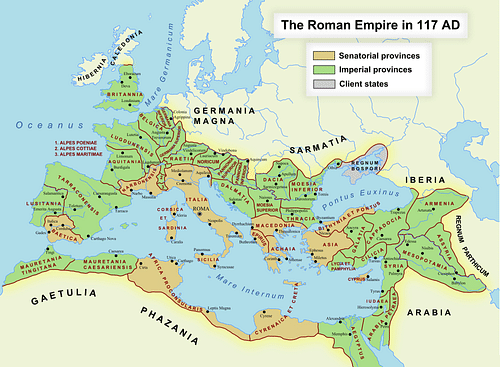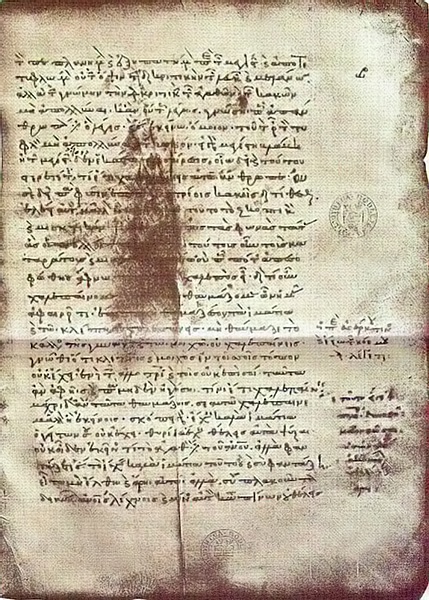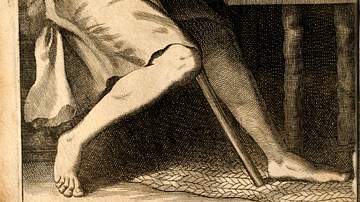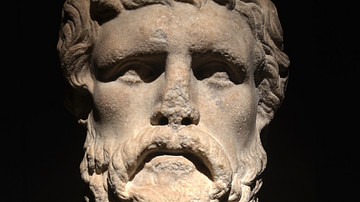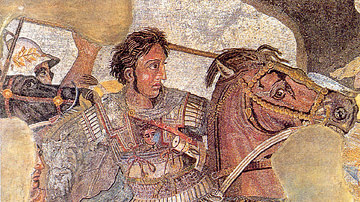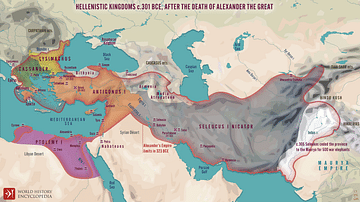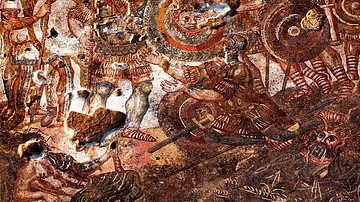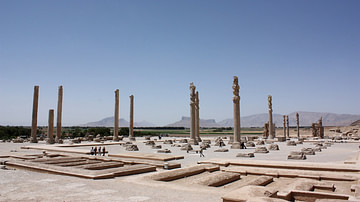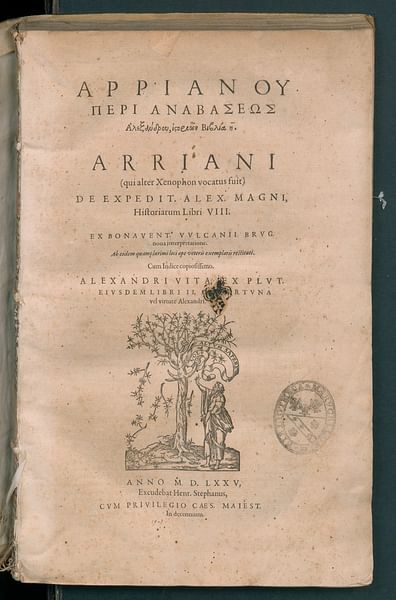
Lucius Flavius Arrianus, commonly known as Arrian (86 - c. 160 CE) was a Greek historian, philosopher, and statesman from Nicomedia, capital of the Roman province of Bithynia. Arrian is recognized as one of the most renowned authors of the 2nd-century CE Roman Empire for his extensive works on Alexander the Great (356-323 BCE). Arrian modeled his writing style after the 4th-century BCE philosopher and historian Xenophon. He earned the nickname “the Second Xenophon” thanks to his work Cynegeticus (On Hunting with Dogs), a revision of Xenophon's Cyropaideia, and one source even gives Arrian's full name as Flavius Arrianus Xenophon.
Early Life
As with other writers of his era, much of Arrian's early life is left to speculation. It is known that his family was considered wealthy and his father was a Roman citizen, although it is unknown when and from whom he received his citizenship. As a youth, Arrian was appointed to the priesthood of Demeter and Kore (another name for Persephone). Like most young, wealthy boys at that time, he received a typical education, studying literature and rhetoric. In 108 CE he traveled to Nicopolis, capital of the Roman province of Epirus, to study with the Stoic philosopher Epictetus (c. 50 - c. 130 CE). One of his fellow students and a life-long friend was the future Emperor Hadrian (r. 117-138 CE). Arrian would later publish his notes from Epictetus' lectures in two works: Encheiridion and Discourses. Like many of Arrian's books and essays, these works would survive into the Middle Ages and serve as a guide for monastic life. With the lessons he learned from Epictetus, Arrian completed his studies in 112 CE and entered upon a political career.
Political Career
Like much of his early life, Arrian's career after leaving Epictetus until he became a consul is mostly conjecture. However, his days in politics and rapid rise through the cursus honorum came as a result of his close friendship with the emperors Trajan (98-117 CE) and Hadrian. Before serving as a consul suffectus with a man only known as Severus (129/ or 130 CE), evidence suggests he may have served as a quaestor at the age of 25 and an aedile at 27. Other sources indicate he was a praetor and the governor of Andalusia, a Spanish province, around 125 CE. References in one of his works, Cynegeticus, as well as his actions as governor of Cappadocia, indicate the likelihood of a military career; he may have served as a cavalry officer on the Danube frontier. There is sufficient evidence to show that he was a member of the private council of the Roman senator and governor of Greece Gaius Avidius Ingranius at Delphi and assisted in judging a border dispute.
After his term as a consul, he was appointed by Emperor Hadrian as governor/legate of the northern Asia Minor province of Cappadocia, serving from 131 to 137 CE. He was only the second Greek ever to be named governor of a Roman province. As governor, he was given command of two Roman legions — an indication that he may have had some military experience. This skill was put to the test when he prevented a battle with the Alans, a tribe from the Central Asian region of Kazakhstan, whose actions threatened both Roman and Parthian provinces. Their attempt to invade Cappadocia in 133 CE was thwarted without a drop of blood being spilled. Arrian would later write of his confrontation with the Alans in his Ektaxis kata Alanon (Battle Formations against the Alans). In it, he offered advice to other Roman commanders on methods essential in fighting against nomads. He wrote a second book, partially lost, around 136/7 CE on military tactics, Ars tactica. It discusses the military organization of the Macedonian and Hellenistic armies as well as the current Roman cavalry exercises.
Early in his role as governor, he took an extensive tour to the north along the shores of the Black Sea, inspecting the area's military garrisons. After returning to his capital, he would order a new channel be dug surrounding the civilian settlement outside the fort, protecting the harbor. Writing in the form of a series of letters to Emperor Hadrian, Arrian spoke of his findings in 25 books entitled Periplus Ponti Euxini. The letters were written in Latin instead of his usual Attic Greek. In 137 CE, Arrian retired to the city of Athens. Never considering himself a Roman, always a Greek, he obtained Athenian citizenship and was inducted into the Eleusinian Mysteries, a cult centering on the Greek goddesses Demeter and Persephone. Later, he served as the archon (145/6 CE) or chief magistrate of the city. This was his last venture into politics. There is little information on his death. After his time as a magistrate in Athens, his political career came to an end and he seems to have disappeared. There is some indication that he died around 160 CE, but that cannot be verified.
Writing Career
It is unknown when Arrian wrote the majority of his books. Whether it was before, during, or after his retirement, Arrian never denied the influence of Xenophon as well as the Greek historians Herodotus (c. 484 - 425/413 BCE) and Thucydides (c. 460/455 - 399/398 BCE) in his books. The “second Xenophon” not only imitated the ancient Greek in his Cynegeticus but also based his biography of Alexander on the seven books of Xenophon's Anabasis. Unfortunately, much of Arrian's works are either lost or in fragments. He wrote Bithyniaca, eight books, now lost, on the history of Bithynia from mythical times to the conquest by Rome. To demonstrate the diversity of his interests, he even wrote a book on meteorology, unfortunately, it is also lost.
Besides his Enchiridion and the eight books (four survive) of Diatribai (Discourses of Epictetus), he also penned twelve books on his conversations with Epictetus (Homiliai Epiktetou). He wrote several biographies; two of them being Dion of Syracuse, who battled for leadership in Sicily but eventually was assassinated, and the statesman Timolean of Corinth - these are also among the lost works. Lastly, he wrote 17 books on the History of the Parthian War or Parthica of which ten of the books detail Emperor Trajan's war of 115 -117 CE. There is some speculation that the books were used by Cassius Dio in his writings.
However, his greatest work is on Alexander the Great - the seven books Anabasis. Detailing Alexander's ascension to the throne of Macedonia until his death in 323 BCE, it serves as a tribute to the great military tactician. Because he believed them to be the most reliable, Arrian based his biography on the works of Ptolemy I (366-282 BCE) and Aristobulus (c. 375-301 BCE). In his introduction to The Campaigns of Alexander, historian J. R. Hamilton wrote that "… Arrian's portrait is more than the sum of his sources; for he possesses a distinct personality of his own which we can detect most clearly in his attitude to religion and morals" (27). Alexander is seen as both a great leader and conqueror, a man with boundless ambition. Arrian describes his feelings about Alexander:
It is my belief that there was in those days no nation, no city, no single individual beyond the reach of Alexander's name; never in all the world was there another like him, and therefore I cannot but feel that some power more than human was concerned in his birth… (quoted in Hamilton, 398)
Recognizing Arrian's respect and admiration for Alexander, Hamilton adds that the historian glossed over the less than attractive side of the great leader. Arrian also wrote a companion piece - the seven-book Indica - discussing the travels of Nearchus' march from India to Susa. Lastly, Arrian wrote on the Wars of the Diadochi, the successors' battle for Alexander's empire 323 -319 BCE in his Events after Alexander. Unfortunately, this is among the lost works of Arrian.
Although many of Arrian's works are now lost, parts or fragments have survived to the present day. The work on Alexander was Arrian's masterpiece and remains an excellent source of information for anyone interested in the life and times of one of the greatest military leaders in history.
